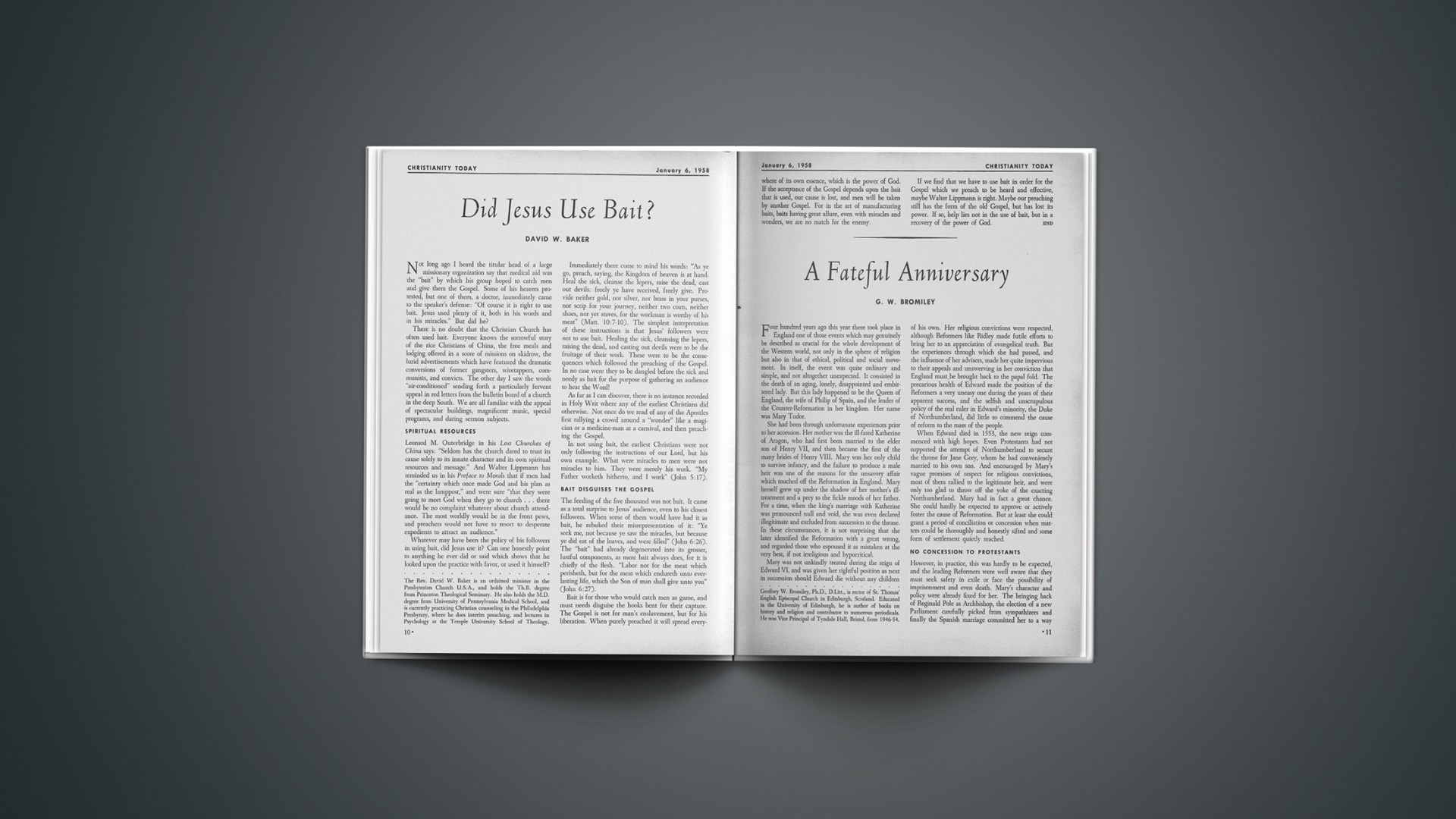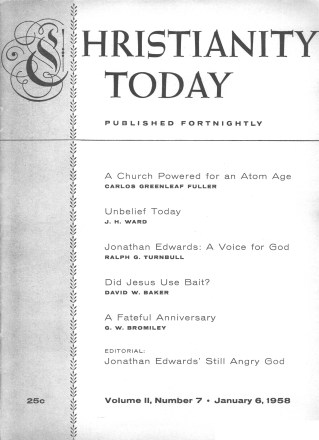Four hundred years ago this year there took place in England one of those events which may genuinely be described as crucial for the whole development of the Western world, not only in the sphere of religion but also in that of ethical, political and social movement. In itself, the event was quite ordinary and simple, and not altogether unexpected. It consisted in the death of an aging, lonely, disappointed and embittered lady. But this lady happened to be the Queen of England, the wife of Philip of Spain, and the leader of the Counter-Reformation in her kingdom. Her name was Mary Tudor.
She had been through unfortunate experiences prior to her accession. Her mother was the ill-fated Katherine of Aragon, who had first been married to the elder son of Henry VII, and then became the first of the many brides of Henry VIII. Mary was her only child to survive infancy, and the failure to produce a male heir was one of the reasons for the unsavory affair which touched off the Reformation in England. Mary herself grew up under the shadow of her mother’s ill-treatment and a prey to the fickle moods of her father. For a time, when the king’s marriage with Katherine was pronounced null and void, she was even declared illegitimate and excluded from succession to the throne. In these circumstances, it is not surprising that she later identified the Reformation with a great wrong, and regarded those who espoused it as mistaken at the very best, if not irreligious and hypocritical.
Mary was not unkindly treated during the reign of Edward VI, and was given her rightful position as next in succession should Edward die without any children of his own. Her religious convictions were respected, although Reformers like Ridley made futile efforts to bring her to an appreciation of evangelical truth. But the experiences through which she had passed, and the influence of her advisers, made her quite impervious to their appeals and unswerving in her conviction that England must be brought back to the papal fold. The precarious health of Edward made the position of the Reformers a very uneasy one during the years of their apparent success, and the selfish and unscrupulous policy of the real ruler in Edward’s minority, the Duke of Northumberland, did little to commend the cause of reform to the mass of the people.
When Edward died in 1553, the new reign commenced with high hopes. Even Protestants had not supported the attempt of Northumberland to secure the throne for Jane Grey, whom he had conveniently married to his own son. And encouraged by Mary’s vague promises of respect for religious convictions, most of them rallied to the legitimate heir, and were only too glad to throw off the yoke of the exacting Northumberland. Mary had in fact a great chance. She could hardly be expected to approve or actively foster the cause of Reformation. But at least she could grant a period of conciliation or concession when matters could be thoroughly and honestly sifted and some form of settlement quietly reached.
No Concession To Protestants
However, in practice, this was hardly to be expected, and the leading Reformers were well aware that they must seek safety in exile or face the possibility of imprisonment and even death. Mary’s character and policy were already fixed for her. The bringing back of Reginald Pole as Archbishop, the election of a new Parliament carefully picked from sympathizers and finally the Spanish marriage committed her to a way of reaction which very quickly became a way of intolerant suppression. One by one the various measures of reform were repealed, Mary’s only failure being in the matter of monastic properties which even the most “Catholic” of beneficiaries refused to restore. The instigators of the Reformation, from bishops on the one hand to humble artisans and even expectant mothers on the other, were committed to prison, and in many cases to flames. Nor was the policy of religious reaction and intolerance matched by progress in the economic or foreign fields. At home, conditions were perhaps even more wretched than they had been under Edward, while abroad England as junior partner with Spain had seldom stood so low in the estimation of other nations.
Perhaps the main question in the minds of Protestants and others during the brief reign of Mary was whether she would have an heir and thus ensure a “Catholic” succession in place of Elizabeth. On many occasions there were rumors that an heir was expected, and once the bells were even rung for his or her supposed birth. The likely source of these rumors was that Mary was suffering from an internal growth from which she finally died, but we can imagine the state of suspense for the country when so many issues were poised in the balance, and no one could tell how the decision would fall.
God Can Work The Improbable
No study is ultimately more futile than that of the possibilities of history. For after all, one of the great interests of history under the guiding providence of God is that even the most probable things do not happen. Yet it is tempting to consider what might not have happened if Mary had really had a healthy successor. Even politically the consequences could have been momentous. England might have been enslaved for many years to Spanish policy, and never have become the seafaring, mercantile and colonizing power which it did under Elizabeth. In these circumstances, there might well have been no development of the dominions or even the United States in their modern form; no emergence of the democratic institutions which these nations have in common; no vigorous development of commerce and industry; no flourishing of independent education; no literature and culture so obviously informed by Protestant convictions and principles. Religiously, of course, the results might have been even more awful to contemplate. Protestantism might well have been finally excluded from England, and in this case the Scottish Reformation would probably have been impossible, the Netherlands might well have succumbed to Catholicism, there would have been no Pilgrim Fathers to spread evangelical truth to the new world, and all the enterprises in which Britain and America especially have been so gloriously identified, whether in the form of religious awakening, missionary expansion or social reform, might never have eventuated. Indeed, it is not impossible that Spain might have maintained its influence far longer than was the case, and ultimately have been the real colonizer of North as well as South America and other parts of the globe. So much of the future depended upon the life or death of Mary Tudor.
The lessons of history are more instructive than its probabilities. And from the situation at the close of the reign of Mary, four simple lessons are to be learned which may stand us in good stead in similar circumstances. The first is obviously the value of a steadfast witness even when the cause seems hopeless. The martyrs who died at the stake did not die in vain. Indeed, they perhaps commended the Gospel in a way in which it had never been commended to the common people by previous reforms. At the very least, it aroused a hatred for the bigotry (however sincere) which could carry through such remorseless persecution, and a respect for simple folk and learned churchmen who cared enough about scriptural truth to be prepared to die for it.
The Lesson Of Restoration
But not all the Reformers were called to die. Some of them sought refuge in exile, not merely for their own safety, but to be ready for a possible restoration. Some Roman Catholic writers have been prepared to see in the exile almost a deliberate and well-considered plan for the possible future. Whether this was consciously the case or not, the fact remains that from the exile there came back to England on Mary’s death an able body of mostly younger leaders able to take up where their fathers had been broken off. We must not despise those who flee when they are persecuted. Some are called to suffer; some to preach elsewhere and at the right moment to return. Even in the most desperate case, prudent measures can rightly be taken for the turn which God may see fit to bring. Preparation for the future may also be an act of faith and obedience.
One of the less fortunate aspects of the exile was that it saw the beginning, or rather the intensification, of discord and division among the English Protestants, with all that this was to mean in the form of later Puritan and Independent controversies. At this point there is a third lesson of warning. Times of weakness and apparent defeat are often times when there is a particular temptation to disagreement. But the call of God in such times is surely to close the ranks, to face the common enemy, to concentrate on the essentials and to work together a step at a time for the basic cause. How much happier might not the ultimate settlement have been, and how much stronger the evangelical cause in England, if the exiles and their successors had overcome at once the kind of division which became such a scandal at Frankfort!
Finally, there is the simple but supreme lesson of the divine overruling of history. This need not be labored. It is so obviously true at so many points that while man proposes, it is not man, whether he be emperor, pope or politician, but God himself who disposes. This has been particularly at the climaxes of history, and most of all when out of apparent disaster God brings a glorious victory like the triumph of Protestantism in England. This is the ultimate challenge to faith in the death of Mary Tudor.
Geoffrey W. Bromiley, Ph.D., D.Litt., is rector of St. Thomas’ English Episcopal Church in Edinburgh, Scotland. Educated in the University of Edinburgh, he is author of books on history and religion and contributor to numerous periodicals. He was Vice Principal of Tyndale Hall, Bristol, from 1946–54.










